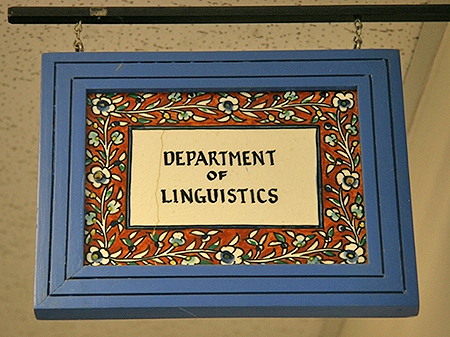
Linguistics ETDs
Publication Date
5-1-2016
Abstract
Extensive research has been carried out for the role played by anticipation in human cognition (Br\xf4ne 2012; Coulson 2005; Huron 2006). Employing the terms 'anticipation' and 'expectation' interchangeably, these studies emphasize only the temporal sequentiality between elements taking place at different points in time, a relation parallel to the progression of time. In modes of communication where simultaneous events are possible, however, there exists a similar but distinct relation between elements simultaneously represented in time. This is expectation, a relation perpendicular to the progression of time. Ubiquitous and indispensable for our understanding of the most ordinary, the relation of expectation has hardly been recognized let alone analyzed in the literature. In view of this, in the present study I contemplate on the nature of expectation, identifying and integrating in a coherent way theoretical notions relevant to the analysis of expectation, including among others the progression of time, conceptual distance (Gärdenfors 2000), processes of conceptual integration and disintegration (Fauconnier and Turner 2002), construction (Croft 2001; Langacker 2008), and intention. Analyzed for illustration are two passages from Wagner's music drama Siegfried: While in the first passage Mime sings words of care and love to music of complaint, in the second, a honeyed tune is heard accompanying the murderous intentions in Mime's words. The cross-modal mismatch in both cases stretches the conceptual distance between Mime's words and music, imposing tension on the listener's expectation that simultaneously represented language and music should 'support' each other. Meanwhile, elements from the language and the music inputs, as well as the unexpected mismatch, are projected into a blend, where new meanings emerge and the mismatch is made sense of. Drawing upon Clark's (1996) insight, the multiplex layers of pretense and coatings of meaning in the convoluted social-interactional dynamics in the two passages are also disentangled and laid out. The analysis of the two passages with cross-modal mismatch underlines the centrality of the hitherto overlooked relation of expectation, and that, much like unfulfilled anticipation, unfulfilled expectation also yields strong emotional effects. The stark contrast between the ease of our understanding of the two passages and the complexity of the analysis further highlights the agility of the cognitive processing that allows us to make sense of the world we are exposed to.
Language
English
Keywords
expectation, simultaneity, mismatch, multimodality, incongruity, language and music
Document Type
Thesis
Degree Name
Linguistics
Level of Degree
Masters
Department Name
Department of Linguistics
First Committee Member (Chair)
Wilcox, Sherman
Second Committee Member
Bashwiner, David
Recommended Citation
Hsu, Hui-Chieh. "Unexpected Accompaniment: Cognitive Mechanisms for Language-Music Mismatch in Time." (2016). https://digitalrepository.unm.edu/ling_etds/18

Comments
Submitted by Hui-Chieh Hsu (hsu@unm.edu) on 2016-04-15T20:49:19Z No. of bitstreams: 1 Unexpected Accompaniment Manuscript 20410 final.pdf: 1647922 bytes, checksum: e8b31fd1eb19f3a746656f8a7a82d882 (MD5), Approved for entry into archive by Doug Weintraub (dwein@unm.edu) on 2016-06-09T17:39:14Z (GMT) No. of bitstreams: 1 Unexpected Accompaniment Manuscript 20410 final.pdf: 1647922 bytes, checksum: e8b31fd1eb19f3a746656f8a7a82d882 (MD5), Made available in DSpace on 2016-06-09T17:39:14Z (GMT). No. of bitstreams: 1 Unexpected Accompaniment Manuscript 20410 final.pdf: 1647922 bytes, checksum: e8b31fd1eb19f3a746656f8a7a82d882 (MD5)